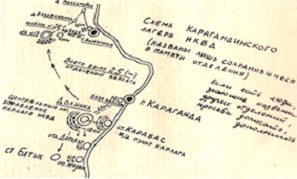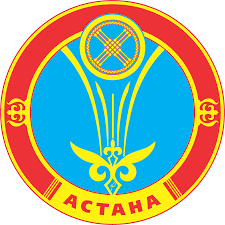Powerful structures actively intruded in the life of any family and individual. Getting equal political rights in a number of legislative acts, women equally with men were subjected to repression and isolated from society. The same articles of prosecution as for men were foreseen for them, but there was one article on which only women could serve in jail – who were CHSIR-(members of families of traitors of motherland). Not committing crime, they had to serve sentence in special camps only for the fact that they were mothers, wives, sisters, and daughters of those, who was accused of betrayal of Motherland.
Karaganda camp occupies special place in the history of repressions. Exactly here in the beginning of 1938 on the base of 26th labor village Akmolinsk woman special department was opened. One of three islands was "Archipelago GULAG", to where authorities brought together those, who got the terms of imprisonment as "CHSIRs" - "members of families of traitors of motherland". Two other camps, to where the "wives of traitors" were sent in 1937-1938 located in Mordovia and Tomsk.
In conversations among each other akmolinsk prisoners ironically called their island an exotic word ALZHIR- Akmolinsk camp of wives of traitors of motherland. These were young, beautiful women, many with children, even with infants. Stalin used to repeat: "No man – no problem". The best part of intelligentsia, color of army, color of people was destroyed.There were beautiful, clever persons, people, used to intellectual or creative labor, are not too taught to submit and not taught to hide their own opinion. Certainly, they were maladjusted, sometimes even to soft. Moreover they did not understand what for they were actually accused and from that they suffered even more. Add to it knowing nothing about fate of their husbands and, that worse, - children. In fact in the first years correspondence was not allowed for women. Nobody of women knew in fact where they were driven. And soldiers guarding them were forbidden to talk anything. And then a young escort whose name was Vanya threw textbook of 5th class with the atlas of Soviet Union, where by a red pencil a city Akmola was noted into one of their carriages. But how to send a message to relatives? To the women, each in a carriage was given a piece of herring and piece of sugar, wrapped in a white paper. Women former revolutionaries, with large camp experience, stated, that throwing out a paper is impossible, and it is needed to divide it by pieces. To use own blood instead of inks, biting herself strongly for a finger, and so that blood streamed… Then they wrapped that bloody messages and threw it into a box, serving as a rest room. When a train departed, the workers of railway had picked up tiny triangles and mailed them according the destination. Many relatives of "ALZHIR" women got from them the first letter, written in exactly "strange" inks, some letters are in the display of our museum.
The whole winter of 1937-1938 a camp received new entrants. The barracks build out of adobe-bricks and not dried yet were filled with women from different cities. All of them were bare shaven. They were pitiful, frightful, looking like ridiculous teenagers. The winter was very cold. In the barracks there were two-storeyed continuous naked plank beds and one stove on the whole barrack.The whole winter of 1937-1938 a camp received new entrants. The barracks build out of adobe-bricks and not dried yet were filled with women from different cities. All of them were bare shaven. They were pitiful, frightful, looking like ridiculous teenagers. The winter was very cold. In the barracks there were two-storeyed continuous naked plank beds and one stove on the whole barrack.
The cell that reflects life of women-prisoners and where there is a cradle was exactly recreated in a museum. Many prisoners arrived with breastfed children. Behind the barbed wire kindergarten was organized, there were children, then these little people of three-four years old were sent to Oskarovskiy orphanage. Women themselves set the right way of life. There was a lake overgrown with cane thereabout. Escorted by convoys and dogs they mowed a cane and bound mates from it, that served them as mattresses. They also heated by a cane. Routine soldiers added it to the stove day and night. There was severe frost. Once, one prisoner, carrying water on a yoke, slipped and fell down. Both buckets fell over on her. She instantly covered by an icy armor. In the barrack women tore off an icy crust from her, and she appeared dry.
There is such fact in memories of "AlZHIRs". Next to a camp, straight behind the lake there is a Kazakh village Zhana - Zhol (now t is there too), so due to this settlement many survived. Once when prisoners worked on a lake, mowed a cane. Old Kazakhs came in large malakhays, women were goingt next to them, they led small children by the hands, and in hands children had bags. In bags, presumably, there was something heavy, like stones. Then children began to throw these stones in prisoners, and escorts started laughing loudly: "Look, what a kind of enemies are you. You are not loved not only in Moscow and even in aul, children throw stones in you". It was offensive to the tears: how children are brought up, we are not guilty! After a while Kazakhs went away. One of the women carried the armful of cane and tripped over stones, and it seemed to smell strange - by milk and cheese. Then prisoners understood that women, children and old men, coming from a nearby aul, risking life, threw in them cheese. This was the baked curd, rolled up in balls, dried up cheese.

When she came in the evening in a barrack, thanked Muslim God for support and asked him to save lives of these women, old men, to give them a health and longevity, to children do not know grief, do not know hunger and loneliness. Not once the habitants of village, making way through reeds, brought bread, oil, and meat. And escorts, standing above, did not see it. One of Prisoners-Germans wrote a poem "Kurt is a precious stone".
A year of high security passed strictly - without letters, without parcels, without some news about freedom. And suddenly all camp was discomposed by an unusual event. One of "ALZHIRS" received a letter, real letter with a brand and postmark. On an envelope was signed with child's handwriting "Akmolinsk city. Prison for mothers". An eight-year girl wrote that after the arrest of dad and mother she was also arrested and sent to children's house. She asked when a mother will return and when will take her to herself. She complained, that it was bad in a children's house, she missed and cried often. How did this baby succeed to know, where her mother was, and to write a letter? Possibly, some NKVD servant had a warm heart. More frequently they had sadistic and cruel heart.
Nevertheless they did not give up! They won daily - their weakness, illness, fear and cold, those who were thrown in summer sun-dresses and output dresses to winter naked steppe, who survived, not losing a human face and soul there.
Now steles and obelisks, dedicated to the victims and martyrs of mass terror stand in the place of former islands of Gulag. Almost nothing remained from former camps, after which the broken fates, disappointed hopes and dreams of our fellow-citizens were buried forever, taken away by cruel wind of Stalin terror in nonexistence.
Now memorial complexes, monuments, memorable signs to the victims of political repressions of soviet epoch are constructed in many cities and settlements of Republic of Kazakhstan.












